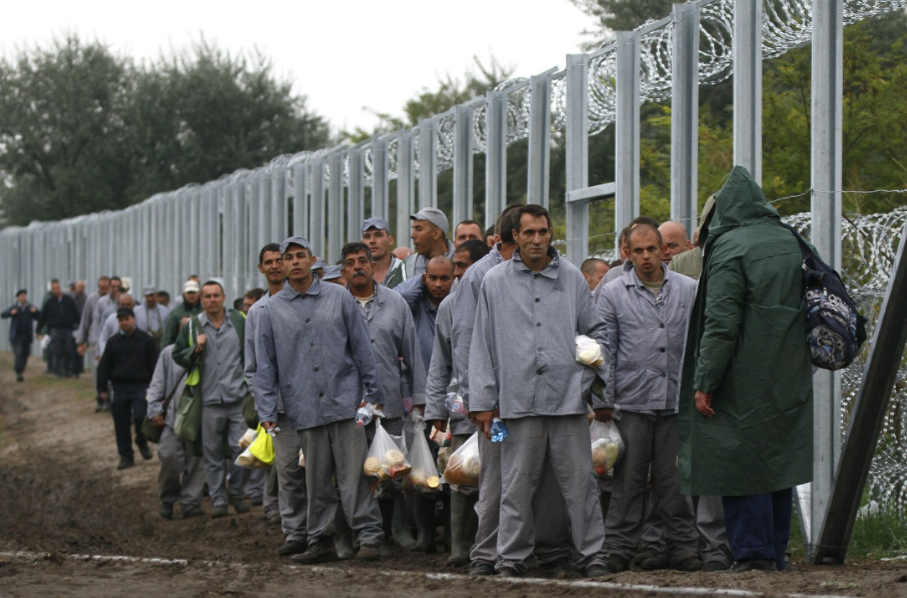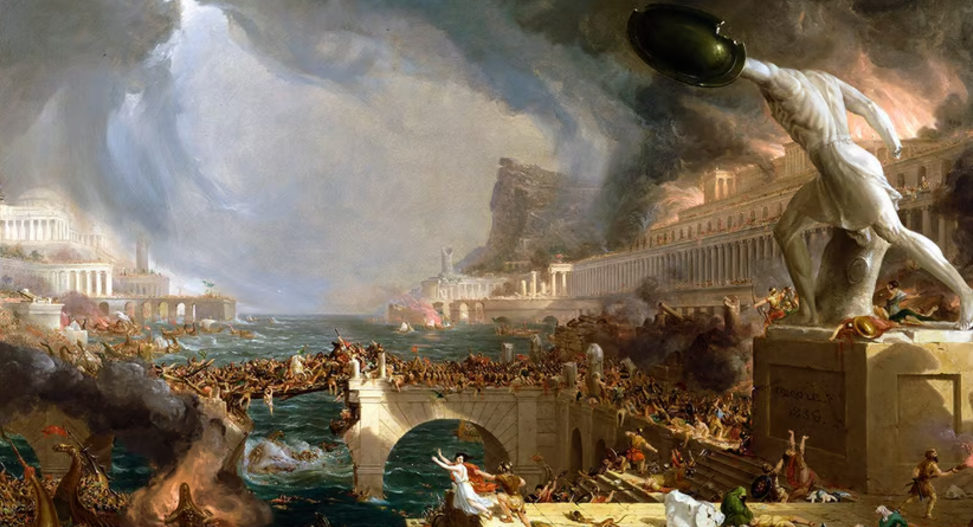By Dimitris Kouvaras,
The contemporary West is faced with tumultuous times, politically speaking. This year especially is one of extraordinary density in developments that will define the course of western politics over the years to come. The (partial) victory of Le Pen’s Far Right in the first round of the French elections and the upcoming US election, with victory laying dangerously within Donald Trump’s grasp after his successful performance at the presidential debate, are both sources of unease and bleak speculation. Britain, on the other hand, is expected (as I write this) to become redder than ever before on July 4th, following the wear and tear of a devastating 14-year Torry rule. Nonetheless, there is a long way until economic or political scars can heal, rendering the British situation no more stable than that of its Atlantic and European partners. These are shaky times.
A persistent element of this turbulence, relating to the political ramifications of illiberal (see Trump) or Far Right (see Le Pen, Orbán, Geert Wilders or Meloni among others) tendencies, and entwined with it in a double feedback loop, is that of an identity crisis of the West. One can observe it in the culture war underlying American Politics since 2016, or even 2009, with the Tea Party and M.A.G.A. (i.e. Make America Great Again) movements ardently challenging narratives of (neo)liberalism and diversity, propagating instead a vision of racial whiteness, moral conservatism, small government and financial libertarianism. One can also sense it in the ways Europe is struggling to come to terms with the question of immigration, a process whose by-product is often derogatory rhetoric towards ethnic or religious minorities, such as Wilder’s islamophobia and Orbán’s castigation of the Roma people. Even the populist Brexit campaign’s manipulation of British pride against an alleged form of EU “colonisation” belongs to the same fabric of identity struggle, which is still well underway.
I argue that this struggle relates to the ways in which the inherited conceptions of the “West” and “western civilisation” as racially white, culturally superior and linearly progressing from Graeco-Roman antiquity to the modern Atlantic world are perceived to be either under threat or treading down a wrong path, resulting in attempts to restore or correct them. The historical backdrop of this development is manifold. Firstly, decolonisation in the latter half of the 20th century shattered the idea of Western global dominance, while notions of cultural and racial superiority became bankrupt as the ensuing migration from former colonies to European metropoles, due to search for labour or acquired citizenship rights, transformed the outlook of the latter in the direction of demographically diverse and multicultural societies. In the US, the civil rights movement, in the 50s and 60s, served as an internal form of decolonisation that ended long-established discrimination against Afro-Americans, challenging the idea of white supremacy. Since the former outsiders became (closer to) insiders through this process, western identity was destabilised. In this context, white-supremacist xenophobic rhetoric in the US and the nativist rhetoric of the European Far Right can be seen as attempts to reconstruct the ethno-racial purity of an imagined past, while Brexit can be construed as a failed attempt to restore the “splendid isolation” Britain enjoyed in its imperial 19th century heyday.

Secondly, the elements infused to the inherited western narrative in the Cold War period became equally contested. Capitalism (as opposed to communism) ceased to be a defining factor after the collapse of the USSR in 1991, and its adoption by geopolitical rivals like Russia and China, while liberal democracy, perhaps the pinnacle of the contemporary understanding of western values, embodying the idea of human and social rights instilled through the social movements of the latter half of the 20th century and dated to Enlightenment thought, faced severe challenges. The financial crises of the 70s, followed by the undertaking and post-2008 collapse of neoliberal economic policies and the asymmetrical development of centres (like London and the coastal US) and peripheries (like Northern England or the Rust Belt in the US), brought with them financial hardships that fostered ideological suspicion towards the liberal model. As this model was closely linked to toleration and diversity, and due to the previously analysed destabilisation of Westen identity, these values came under threat, minorities, non-whites and immigrants becoming the ideal scapegoats. In the case of the US, the loss of the uncontested predominance it enjoyed in the 90s, also played a part in providing fertile ground for a M.A.G.A. rhetoric and its exclusionary by-products. Given the rise of problematic politics both in the US and Europe, the West’s identity seems to be hovering between two antithetical poles: a liberal, yet disputed vision, that does not eschew contradictions, and a reactionary one aiming at an imagined hegemonic past. But is that all there is?
The answer is negative, and thus affirmative of an alternative. Having established the role played by the narrative of the West (through the reactions to its disillusionments) in sustaining illiberal, secessionist or far right politics, it is time to consider the validity of the narrative itself. As any type of narrative, it is but a construction, one that reimagines the past according to the political and ideological demands of each present. In specific, the narrative of western civilisation as pristine, dominant, white and superior took shape in stages from the 17th to the 19th century, never being fully unchallenged. It was founded on cultural developments like the Renaissance emphasis on Graeco-Roman antiquity, political strategies like Habsburg anti-Ottoman propaganda in the 16th century, intellectual currents like Enlightenment thought, and ideological requisites like racialisation in 18th century slave-owning US and the justification of the “civilising mission” by European empires the century after. As a past, it is an imagined past, despite its tangible consequences.

Historical reality is different, more complex and diverse, and doesn’t justify nativist obsessions and far right exclusions. Culture is not an immutable essence, but a transferable and malleable entity produced through various influences. Such influences between “the West and the Rest” have been prominent in European history since antiquity, and often formed the basis of culturally appropriated genealogies of the West, being part of its self-identification. Romans, for example, were proud of their alleged Trojan, i.e. Asian, descent. What’s more, the notion of Europe, and later that of the West, was never geographically fixed or unambiguously homogenous, nor a linear progression from Greco-Roman antiquity. For Aristotle, the Greeks belonged to none of the continents, instead occupying an advantageous middle position, while for the 12th century Holy Roman Empire, “Europe” meant central Europe, without its eastern orthodox counterpart. The West, as a legitimising cultural sphere, was not inaccessible either, as examples of African Christian converts attest to. This is a different history than that of the inherited narrative, yet an equally powerful one in its possibility to forge a new identity for the West.
Narratives are powerful, as they form part of people’s understanding of the world. Challenging them when untrue is necessary for societal progress and for eschewing the ramifications of an identity crisis, itself created by the dissonance between established narrative and reality. In this case, given the way traditional narratives of the West are weaponised by exclusionary politics and represent a false version of history, it’s high time they be thrown out the window and replaced by a more nuanced and open identity that takes the West for what it is: interconnected with “the Rest”, not only with virtues but also with vices.
References
- Gary Gerstle. The Rise and Fall of the Neoliberal Order: America and the World in the Free Market Era. Oxford University Press.
- Naoise Mac Sweeney. The West: A New History of an Old Idea. Penguin.
- Nicholas De Genova. “The European Question: Migration, Race and Postcoloniality in Europe”. Social Text. V 34 n(3).




